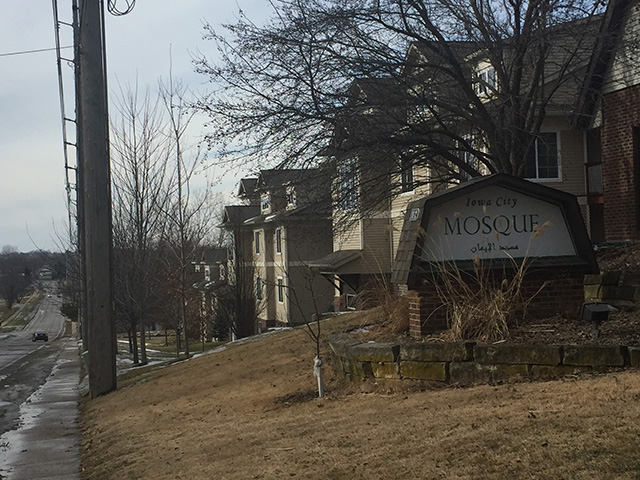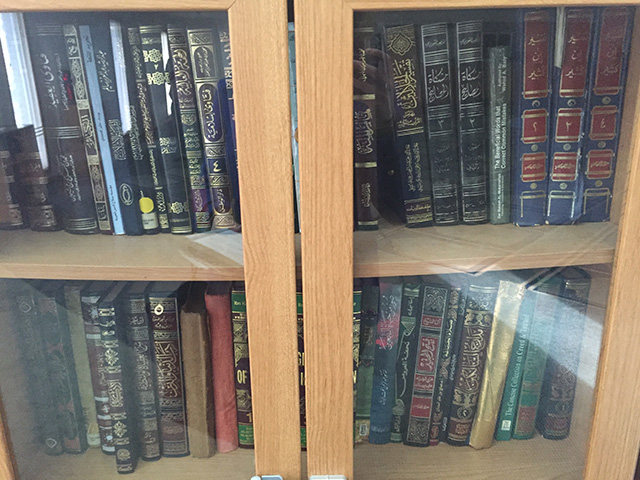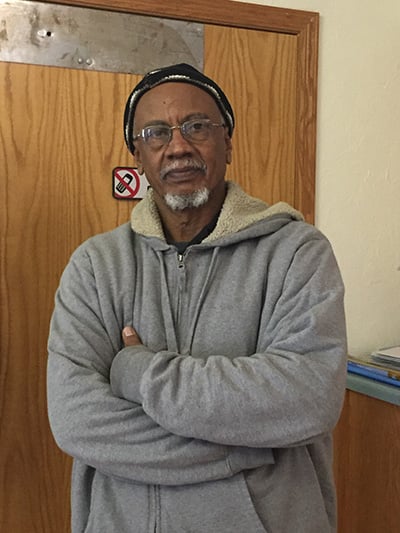
Part of the Series
Beyond the Sound Bites: Election 2016
Being called “Sammy” makes life easier for a little boy named Osama. The 6-year-old adopted the nickname after being teased at school, often for his Muslim heritage. “He’s decided his name can’t be a Muslim name,” explained Lisa Killinger, the president of the Islamic Center of the Quad Cities, where she met Osama and his family. “He’s a lighter skin child. The darker skin children are not afforded that luxury.”
Killinger believes that the terrorist attacks in Paris and San Bernardino, California, sparked fear matched only by the atmosphere in the United States immediately after 9/11. As the country looks to Iowa for the 2016 presidential caucus, Killinger and her fellow members of the Muslim community contemplate how to navigate a splintered political climate where the leading Republican candidate supports a ban on Muslim travel and immigration to the United States.
“Donald Trump [is] way too reminiscent of Germany in the 1930s,” Killinger told Truthout. “It’s a scary race for Muslims in America. To think that those words can be said and catapult you to the front-runner.”
The Islamic Center, located in Moline, Illinois, feels a fueled fire. The mosque hired security in mid-December after an increase in threats and vandalism against Muslims across the United States. The Islamic Center hasn’t received threats, but Killinger and her friends still worry. “Every day I get on my newsfeed, there’s another mosque that’s been burned or vandalized,” she said. “It’s very concerning especially for the children. They’ve done nothing besides having a foreign sounding name or browner skin.”
 Dozens of Qur’ans line the shelves at the Iowa City Mosque. (Photo: Morgan Frances Gilbard)
Dozens of Qur’ans line the shelves at the Iowa City Mosque. (Photo: Morgan Frances Gilbard)
Killinger looks across the Mississippi River to Iowa, home of the United States’ first 2016 caucus. The Muslim population is slightly above the national average in Iowa: Muslims make up 1 percent of Iowa’s population, whereas they make up 0.9 percent of the US population as a whole.
As a small and increasingly marginalized minority group, Muslims remain a major topic of conversation among some Republicans in the lead-up to the caucuses. Trump is not the only candidate to have responded to the refugee crisis and domestic terrorism with Islamophobic rhetoric: Ted Cruz and Mike Huckabee’s national security proposals have also often conflated Muslims with terrorists and showed a lack of empathy for those impacted by the Syrian war. While many of their fellow party members criticized the remarks, some applauded the candidates for rejecting what they describe as “politically correct” attitudes toward Muslims.
“They [Muslims] get to pray whenever they want. Why can’t I pray whenever I want?” said Linda Renkes – who in reality can legally pray when she wants – during a Chris Christie town hall event on January 29 in Davenport, Iowa. “People don’t stand up for the Christians. What about me being offended?”
Imam Taha Atta Tawil of Mother Mosque in Cedar Rapids, Iowa, actively tries to create a dialogue between Muslims and the rest of the community. Political conversations are not usually held at the mosque, but Tawil invited Trump to visit in early January. Trump never responded to the offer, which served as both an olive branch and litmus test for the Republican candidate. His refusal to engage did not help his reputation among Muslims in Cedar Rapids.
“I hope America doesn’t elect him. He is spreading hate throughout our country,” Tawil said.
Tawil is not sure if more eligible Muslim voters will caucus on February 1, but he says that regardless of whether they vote, Muslims throughout the nation are feeling the impacts of a particularly Islamophobic campaign season.
“It is a constant conversation, a constant fear. We talk about it all the time,” he told Truthout. “People have become afraid after seeing the burned mosques and the broken windows on the internet. We are grateful that it hasn’t happened in Iowa.”
 Idris Idris (above) said he and his friends at the Iowa City Mosque have not personally faced any Islamophobic attacks in the run-up to the Iowa caucus. (Photo: Morgan Frances Gilbard)While the national climate is on the minds of Muslims in Cedar Rapids, not all Muslims in Iowa feel affected by the racist comments of the Republican front-runners in the presidential race. “Nobody’s bothered us here. We are quiet people,” said Idris Idris, who moved to Iowa City in 2011 after living for several years in Virginia. He had little to say about the election, but was proud of the mosque – a humble home converted so its patrons would have enough space to pray. Little else was needed and little else mattered.
Idris Idris (above) said he and his friends at the Iowa City Mosque have not personally faced any Islamophobic attacks in the run-up to the Iowa caucus. (Photo: Morgan Frances Gilbard)While the national climate is on the minds of Muslims in Cedar Rapids, not all Muslims in Iowa feel affected by the racist comments of the Republican front-runners in the presidential race. “Nobody’s bothered us here. We are quiet people,” said Idris Idris, who moved to Iowa City in 2011 after living for several years in Virginia. He had little to say about the election, but was proud of the mosque – a humble home converted so its patrons would have enough space to pray. Little else was needed and little else mattered.
Others in the community echoed Idris’ sentiments to a certain extent. Hossain Keatra, who attends the Iowa City Mosque, said, “It looks like most people aren’t interested in politics in our community” but suggested that the intensity of Trump’s comments about Muslims did catch the attention of some of his fellow worshippers.
It is impossible to project how many Muslim voters might caucus, as the faith makes up such a small portion of the voting pool that data is not frequently collected nor used. But Muslims in Iowa still hope that their fellow citizens will keep them in their minds and hearts at the polls.
“Do not make us one broad stroke,” Tawil said. “This is not the America we know.”
Help us Prepare for Trump’s Day One
Trump is busy getting ready for Day One of his presidency – but so is Truthout.
Trump has made it no secret that he is planning a demolition-style attack on both specific communities and democracy as a whole, beginning on his first day in office. With over 25 executive orders and directives queued up for January 20, he’s promised to “launch the largest deportation program in American history,” roll back anti-discrimination protections for transgender students, and implement a “drill, drill, drill” approach to ramp up oil and gas extraction.
Organizations like Truthout are also being threatened by legislation like HR 9495, the “nonprofit killer bill” that would allow the Treasury Secretary to declare any nonprofit a “terrorist-supporting organization” and strip its tax-exempt status without due process. Progressive media like Truthout that has courageously focused on reporting on Israel’s genocide in Gaza are in the bill’s crosshairs.
As journalists, we have a responsibility to look at hard realities and communicate them to you. We hope that you, like us, can use this information to prepare for what’s to come.
And if you feel uncertain about what to do in the face of a second Trump administration, we invite you to be an indispensable part of Truthout’s preparations.
In addition to covering the widespread onslaught of draconian policy, we’re shoring up our resources for what might come next for progressive media: bad-faith lawsuits from far-right ghouls, legislation that seeks to strip us of our ability to receive tax-deductible donations, and further throttling of our reach on social media platforms owned by Trump’s sycophants.
We’re preparing right now for Trump’s Day One: building a brave coalition of movement media; reaching out to the activists, academics, and thinkers we trust to shine a light on the inner workings of authoritarianism; and planning to use journalism as a tool to equip movements to protect the people, lands, and principles most vulnerable to Trump’s destruction.
We urgently need your help to prepare. As you know, our December fundraiser is our most important of the year and will determine the scale of work we’ll be able to do in 2025. We’ve set two goals: to raise $81,000 in one-time donations and to add 1250 new monthly donors by midnight on December 31.
Today, we’re asking all of our readers to start a monthly donation or make a one-time donation – as a commitment to stand with us on day one of Trump’s presidency, and every day after that, as we produce journalism that combats authoritarianism, censorship, injustice, and misinformation. You’re an essential part of our future – please join the movement by making a tax-deductible donation today.
If you have the means to make a substantial gift, please dig deep during this critical time!
With gratitude and resolve,
Maya, Negin, Saima, and Ziggy